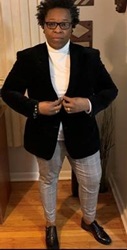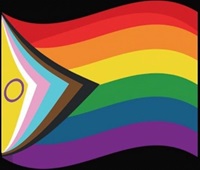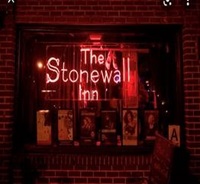"I Love the LGBTQ Community. I am Them."
 Dr. Aissa Williams is a Black lesbian who tells an all too familiar story of facing isolation, bias and discrimination as a result of her sexual orientation and gender identity.
She is incredibly accomplished. A 21-year veteran of the Department of Children and Families, Dr. Williams currently works at the New Haven Area Office. She has earned her Doctorate in Social Work from Walden University and now serves on two community boards, is a therapist and consultant. Dr. Williams is also an adoptive parent.
Dr. Aissa Williams is a Black lesbian who tells an all too familiar story of facing isolation, bias and discrimination as a result of her sexual orientation and gender identity.
She is incredibly accomplished. A 21-year veteran of the Department of Children and Families, Dr. Williams currently works at the New Haven Area Office. She has earned her Doctorate in Social Work from Walden University and now serves on two community boards, is a therapist and consultant. Dr. Williams is also an adoptive parent.
"I am more than my label," she stated. "I have to be that role model."
Dr. Williams speaks with such clarity and from a place of strength about her life experiences - those both painful and successful.
Dr. Williams' family relocated to Connecticut from South Carolina in 1969. They settled in the Hill Section of New Haven, surrounded by neighbors, some would become friends; including those who identified as gay and transgender. In the 80's, when society reacted harshly to those who lived a seemingly different lifestyle, it was her family who embraced others and their unique identities and expressions.
As an adolescent, Dr. Williams realized her own sexual orientation as a lesbian which she believed was accepted by her family. "My mother knew, and I knew my mother knew," Dr. Williams stated. Yet, her life changed one night when she was "outed" by her own mother while being referred to as a "bulldagger," a term which holds a derogatory meaning in the LGBTQ community. It appears the "family secret" was known by others outside the family resulting in a life altering consequence given to her - teenaged Aissa was kicked out of her house.
 "How could my mother reject me but be friends with these other people," Dr. Williams would ask herself. Dr. Williams did not speak to her mother for the next seven years. "As a Black person, I had strong connections to the church. I was rejected there as well."
"How could my mother reject me but be friends with these other people," Dr. Williams would ask herself. Dr. Williams did not speak to her mother for the next seven years. "As a Black person, I had strong connections to the church. I was rejected there as well."
At the age of 18, Dr. Williams now found herself homeless, with limited financial resources and not knowing from where her next meal would come.
Dr. Williams draws many comparisons at this point in her life to those youth involved with the Department, who may face harsh responses from their own families after disclosing their gender identity and sexual orientation. They too may be rejected, become unstably housed, and displaced from their communities. "Parents must be willing to unconditionally support their child," she stated. "Being a parent does not give you the power to control the child's narrative."
Dr. Williams believes our kids need that one stable person who can validate their feelings - just like she was afforded at the time.
Despite this trauma, Dr. Williams' sexual orientation was validated by her grandmother; the matriarch of the family, from whom she gained such inner strength. "Without her, who knows where I would be," Dr. Williams stated.
"You are still my Nene," her grandmother told her. While Dr. Williams and her grandmother never talked directly about being a lesbian, she met Dr. Williams' partners and never questioned her about her sexual orientation. "She was that one person we need for support," Dr. Williams stated with much affection. "I was always grandma's girl."
"She was my courage and my strength."
As a young adult, Dr. Williams was brought to her first job interview by her brother who had been offered a job opportunity but instead he decided to advocate for her to get the job. "This is my sister," she remembers him saying. She was hired and from there her career in foodservice began. She worked her way up from a dishwasher to a chef, even working while attending culinary school in Virginia as a chef in a Japanese Restaurant in Washington, D.C., a Black woman with dreadlocks - advancing her way from dishwasher to chef over the next 12 years.
It was while working that Dr. Williams suffered a near fatal injury. Breaking her neck so severely, hospital personnel told her there was not a valid medical reason why she was not dead. "The doctor told me I was either mean as hell or God has a plan for you," Dr. Williams laughed. During her recovery, she decided to go back to school.
Dr. Williams came back to Connecticut to assist her family in caring for a family member. After starting out at Gateway Community College, she eventually enrolled at Southern Connecticut State University and earned a Bachelor's degree in Sociology. She eventually met Toni Ligon, a DCF employee who encouraged her to apply at DCF. Dr. Williams work at the Agency began but she wanted to do more. She received her Master's in Social Work Degree from Fordham University. She was still not done - onto her Doctorate!
"I can't stop. In order to be seen other than just a Black, lesbian woman, I need goals and have to accomplish them."
 "I can't measure the pressure," Dr. Williams responded when asked about her thoughts on how others view her. "When I step into a room, I represent Black, lesbian women and have to be mindful of how I dress and interact with others." This starts with her morning routine. " I check myself in the mirror and question how the world is going to see me. If I don’t make a good impression, I might be dismissed at the start."
"I can't measure the pressure," Dr. Williams responded when asked about her thoughts on how others view her. "When I step into a room, I represent Black, lesbian women and have to be mindful of how I dress and interact with others." This starts with her morning routine. " I check myself in the mirror and question how the world is going to see me. If I don’t make a good impression, I might be dismissed at the start."
Dr. Williams recognizes she does not fit society's perception of a woman which has resulted in her developing particular strategies to offset the negative connotations associated with labels which may impede her success.
In college, a Professor pointed out to Dr. Williams that he observed her taking over the space in the classroom by arriving early and establishing a commanding presence. "I have learned how to navigate the room over the years," Dr. Williams confirmed. This means before entering a room she will anticipate who will be present, where she should sit and how to conduct herself, so a favorable impression is left.
Dr. Williams is an inspiration. What she has accomplished in her life and what she represents to those around her, has and will continue to influence lives in the future. That inner drive will remain to educate others leading to a more accepting society.
"I want people to see me as a person who is compassionate and has something to offer. I can help to improve the lives of others who are marginalized," Dr. Williams emphatically stated.
"There is so much more to our community than just how we express ourselves. I love the LGBTQ community. I am them."

